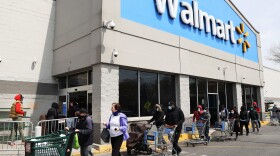
Alina Selyukh
Alina Selyukh is a business correspondent at NPR, where she follows the path of the retail and tech industries, tracking how America's biggest companies are influencing the way we spend our time, money, and energy.
Before joining NPR in October 2015, Selyukh spent five years at Reuters, where she covered tech, telecom and cybersecurity policy, campaign finance during the 2012 election cycle, health care policy and the Food and Drug Administration, and a bit of financial markets and IPOs.
Selyukh began her career in journalism at age 13, freelancing for a local television station and several newspapers in her home town of Samara in Russia. She has since reported for CNN in Moscow, ABC News in Nebraska, and NationalJournal.com in Washington, D.C. At her alma mater, Selyukh also helped in the production of a documentary for NET Television, Nebraska's PBS station.
She received a bachelor's degree in broadcasting, news-editorial and political science from the University of Nebraska-Lincoln.
-
This year's back-to-school shopping season lands in the middle of the highest inflation in four decades — how will this affect spending?
-
Large retailers have spent billions of dollars to woo workers. Smaller stores that can't do that expect staff shortages will lead to lost sales. They're asking shoppers to be patient.
-
September was expected to be the month of mass returns to the office. Now the surging extra-contagious coronavirus variant has employers wondering what to do.
-
Average wages for nonmanagers at restaurants and bars hit $15 an hour in May, but many say no amount of pay would get them to return. They are leaving at the highest rate in decades.
-
In the pandemic, a third of Americans struggle to pay usual costs, even some earning over $100,000. But living on the edge financially is nothing new in the U.S. Three households share their budgets.
-
The CEOs tell Congress that the giant American tech companies do not stifle competition, saying the concern that too much power is concentrated in too few companies is unfounded.
-
Walmart and Sam's Club, as well as Kroger, join a growing list of retailers making masks mandatory in stores. The National Retail Federation is urging all stores to adopt the same policy.
-
In this lockdown, low-wage workers have been publicly declared "essential" — up there with doctors and nurses. But the workers say their pay, benefits and protections don't reflect it.
-
The grocery-delivery app faces a new wave of discontent. Working for an algorithm means tweaks can upend a livelihood — and being a faster, nicer, more experienced worker doesn't guarantee better pay.
-
NPR has found that Walmart is changing the job requirements for front-door greeters in a way that appears to disproportionately affect workers with disabilities.










